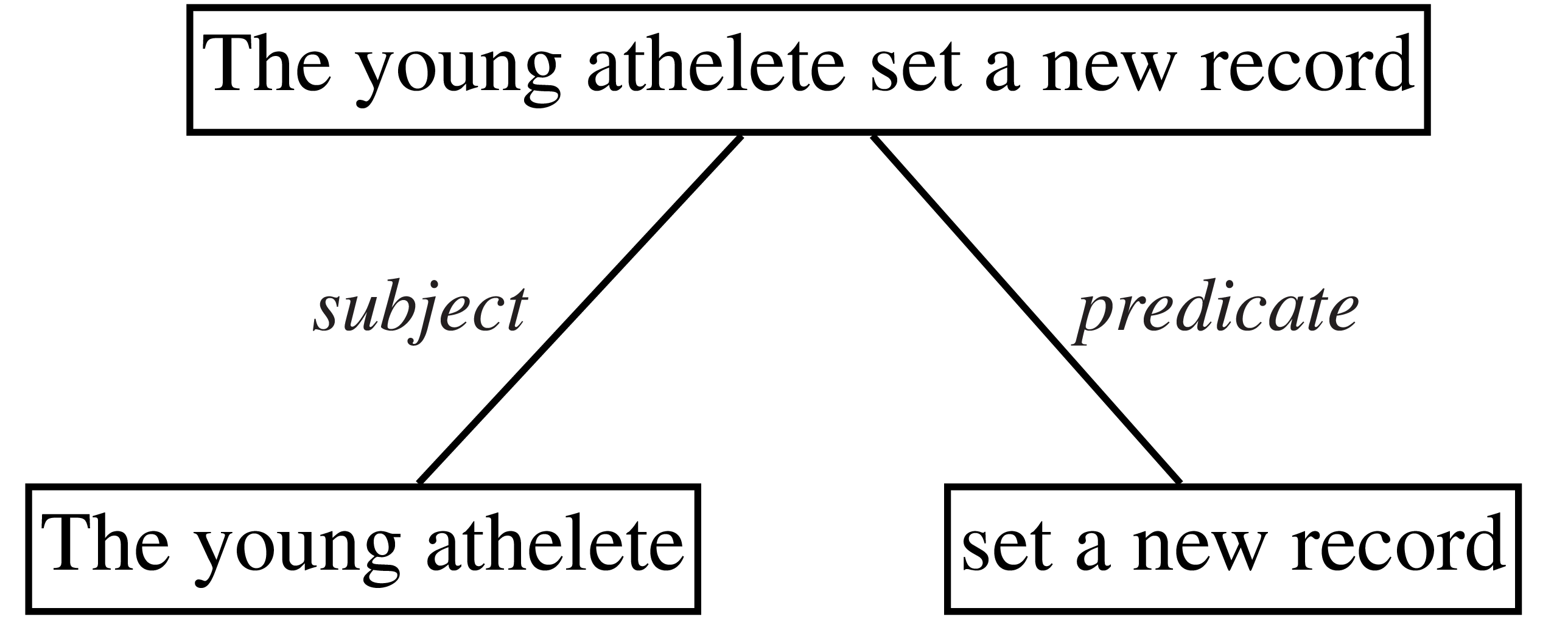www.entitymodelling.org - entity modelling introduced from first principles - relational database design theory and practice - dependent type theory
Types of Phrase
Our example sentence is of a type that is often termed a `simple' sentence and consists of a subject followed by a predicate as shown in figure 4. Other examples of the same type, subject followed by predicate, are shown in table 1; each subject in the table can equally combine with any of the given predicates to form a well-formed sentence. Though ten sentences are presented by combining different subjects with different predicates we can generate 100 different sentences1. What we cannot do is pair any two subjects to produce a well-formed sentence nor any two predicates. This illustrates that subject phrases and predicate phrases are of distinct types. These are the types `noun phrase' and `verb phrase' respectively. These types of phrase can appear in other contexts within sentences but for now they appear as subject and predicate respectively.
This simple rule:
|
S
NP VP
|
(1) |
using some self evident abbreviations is of a type sometimes referred to as a production, aggregates of which are used to express grammars technically referred to as context free grammars. This is a formal expression of the fact that a sentence(S) may be constructed as a noun phrase(NP) followed by a verb phrase(VP).

| Subject | Predicate | |
|---|---|---|
| 1. | We | had arrived at the wrong house. |
| 2. | The man | could open the door. |
| 3. | Truffles | are a kind of fungus. |
| 4. | The house on the corner | is for sale. |
| 5. | She | went to see who was at the door. |
| 6. | The rain and fog | dissipated. |
| 7. | There | are five cats in the hall. |
| 8. | The film that I saw last night | was depressing. |
| 9. | It | is raining. |
| 10. | It | is possible that Alfred will know the answer. |
What such a rule (1) does not do is to give a name to the role played by the noun phrase (NP) in the sentence -- that of subject -- and nor does it give a name -- predicate -- to the role played by the verb phrase (VP). In Entity Modelling we have a notation for just such matters and accordingly we can represent the subject-predicate rule inclusive of role names by the entity model fragment shown in figure 5.
- every simple sentence has exactly one subject which is a noun phrase
- every simple sentence has exactly one predicate which is a verb phrase
The entity type `phrase' of figure 3 is very general - it covers entities such as whole sentences, and the noun phrases and verb phrases shown in the subject and predicate columns of table 1. Linguists recognise these different phrase types and, just as for the different types of words, phrases may be substituted in sentences by phrases of like type without effecting the acceptability of the sentence. Table 2 shows some of the major distinctions within phrase types.
| phrase type | abbreviation | examples |
|---|---|---|
| whole sentence | S | the young athelete set a new record |
| noun phase | NP | the young athelete, a new record |
| verb phrase | VP | set a new record |
| adjectival phrase | AP | |
| prepositional phase | PP |
This leads us to be able to refine the entity type `phrase' in figure 3 by a generalisation as follows:
In the next two sections we continue the process of refinement - we describe the composition relationships that are possible between the different phrase types of a sentence. In this way we use the entity modelling notation as a meta-language in which we describe how different types of sentence constituent can be combined into grammatical sentences and in so doing present a description of a set of rules for sentence construction. There is not, in linguistic theory, an unequivocal set of rules to follow - the rules we choose to model follow close to those presented by Brinton.